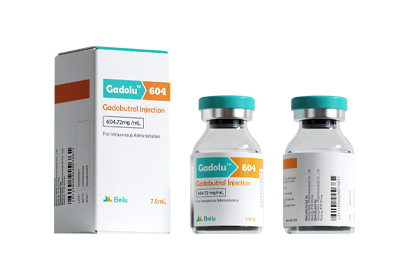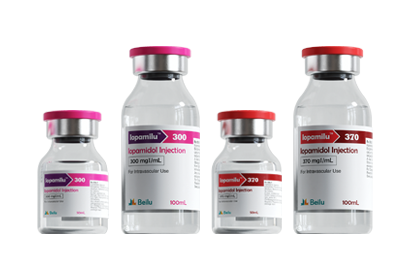1. Contrast media definition
There are many types of contrast medium in the clinic, and different types of contrast medium will produce different feelings after they are injected into patients. For example, some patients may experience mild pain of the elbow or mild fever during the injection of contrast media products used in enhanced CT.
The injection uses a high-pressure syringe, which can speed up the flow rate of the contrast medium. At the same time, since the contrast medium is viscous, the osmotic pressure is relatively high. Therefore, it will stimulate the blood vessels, such as causing blood vessels to dilate and leading to corresponding symptoms in patients. Some patients may also experience palpitation symptoms such as accelerated heart rate due to excessive tension during the operation.
However, contrast-enhanced ultrasound is better. Most patients have no symptoms when the contrast medium is injected through the elbow veins.
2. Types of contrast media in radiology
(1) Gadopentetate dimethyl meglumine injection/API
Gadopentetate dimethyl meglumine injection is the first gadolinium contrast medium launched by Beijing Beilu Pharmaceutical Co., Ltd. in China in 1992. It has the same safety effects as the original product but is more cost-effective. Beijing Beilu Pharmaceutical Co., Ltd. provides 469mg/ml 10ml, 12ml, 15ml, and 20ml MRI preparations.
(2) Gadobutrol injection/API
Gadobutrol injection is a macrocyclic gadolinium contrast medium, which is more stable than linear cerebrospinal enhanced magnetic resonance imaging (MRI) and enhanced magnetic resonance angiography (CE-MRA), and it is not easy to release gadolinium. Beijing Beilu Pharmaceutical Co., Ltd. provides products with a specification of 604.72mg/ml 7.5m.
(3) Gadolinium dimeglumine injection
Gadopentetate dimeglumine injection is a paramagnetic contrast medium for diagnostic magnetic resonance imaging (MRI) of the liver and central nervous system. Beijing Beilu Pharmaceutical Co., Ltd. provides 10ml specifications.
(4) Ferric ammonium citrate effervescent granules
This oral magnetic resonance contrast medium is one of the different types of MRI contrast that can significantly improve the image quality of MRCP and MRU, and can also be used as a positive contrast medium for the digestive tract. Beijing Beilu Pharmaceutical Co., Ltd. offers specifications of 3g: 0.6g (Fe 129mg) and 6g: 1.2g (Fe 258mg).
3. Intravenous contrast media administration
A rapid injection is required with a high-pressure syringe. In general, the injection speed during the inspection is between 2ml~5ml/S. The injection speed of children is between 1.5~3ml/S.
To prevent contrast-medium nephropathy, hydration is usually administered to patients. Oral rehydration is recommended for intravenous users, starting 4-6 hours before the contrast medium injection, and continuing to 24 hours after the contrast medium is used. 100 ml/h water or normal saline should be used by taken orally. It is recommended to use the hydration method of intravenous rehydration if conditions permit.
4. IV Contrast medication contraindications
IV contrast medication contraindications include diabetes, kidney disease, heart disease, asthma, allergies, pheochromocytoma, myasthenia gravis, multiple myeloma, sickle cell disease, etc. However, doctors perform flexible, and sometimes patients with asthma or kidney disease still get injections.
5. Contrast media side effects
The main side effect in the examination of intravascular injection of contrast medium is allergy. However, most people will not have contrast medium allergy. So, there is no need to worry about it. Doctors know the indictions and they will check for allergies before performing an angiogram. Surgery can be considered for varicose intravenous. In addition, a long time of standing or walking should be avoided in daily life.
 Iohexol Intermediate 5-Amino-N,N'-bis(2,3-dihydroxypropyl)-2,4,6-triiodo-1,3-benzenedicarboxamide
Iohexol Intermediate 5-Amino-N,N'-bis(2,3-dihydroxypropyl)-2,4,6-triiodo-1,3-benzenedicarboxamide
 Iohexol/Ioversol Intermediate 5-Amino-N, N'-bis(2,3-dihydroxypropyl)-2,4,6-triiodo-1,3-benzenedicarboxamide
Iohexol/Ioversol Intermediate 5-Amino-N, N'-bis(2,3-dihydroxypropyl)-2,4,6-triiodo-1,3-benzenedicarboxamide
 Ioversol Intermediate (order based) N, N'-Bis(2,3-dihydroxypropyl)-5-(glycoloylamino)-2,4,6-triiodoisophthalamide
Ioversol Intermediate (order based) N, N'-Bis(2,3-dihydroxypropyl)-5-(glycoloylamino)-2,4,6-triiodoisophthalamide
 Iopamidol Intermediate (order based) 5-Amino-2,4,6-triiodoisophthalic acid
Iopamidol Intermediate (order based) 5-Amino-2,4,6-triiodoisophthalic acid
 Iopamidol Intermediate (order based) 5-Amino-2,4,6- triiodisophthaloyl acid dichloride
Iopamidol Intermediate (order based) 5-Amino-2,4,6- triiodisophthaloyl acid dichloride
 Diethylenetriaminepentaacetic acid (DTPA)
Diethylenetriaminepentaacetic acid (DTPA)

 EN
EN
 jp
jp  fr
fr  de
de  es
es  ru
ru  ar
ar 



























 Call us on:
Call us on:  Email Us:
Email Us:  No.3 Shuiyuan West Road, Miyun District, Beijing, China
No.3 Shuiyuan West Road, Miyun District, Beijing, China 